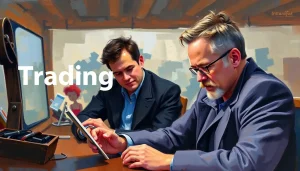Seasoned traders and ambitious newcomers alike are discovering unprecedented opportunities in Britain’s £6.6 trillion derivatives market, where fortunes can be built or broken with a single strategic move. This colossal figure represents not just the potential for profit, but also the immense responsibility that comes with navigating the complex world of futures trading in the UK.
Futures trading, at its core, is a financial dance of prediction and precision. It’s a contractual agreement to buy or sell an asset at a predetermined price on a specific future date. But in the UK, it’s so much more than that. It’s a vital cog in the machinery of the British financial market, providing liquidity, price discovery, and risk management tools for businesses and investors alike.
The roots of futures trading in the UK run deep, intertwining with the country’s rich history of commerce and finance. While the concept of futures contracts dates back to ancient civilizations, the modern futures market in Britain began to take shape in the 19th century. The London Metal Exchange, established in 1877, stands as a testament to the UK’s pioneering role in the development of organized futures trading.
Diving into UK Futures Trading Markets and Products
When it comes to futures trading in the UK, the landscape is diverse and dynamic. The London Metal Exchange (LME) remains a cornerstone of the UK futures market, specializing in industrial metals. But it’s not alone in this arena. The Intercontinental Exchange (ICE) Futures Europe, based in London, offers a wide range of futures contracts, including energy, agricultural commodities, and financial products.
These exchanges are the beating heart of UK futures trading, but what exactly are traders buying and selling? Popular futures contracts in the UK span a broad spectrum. From Brent crude oil futures, which serve as a global benchmark for oil prices, to FTSE 100 index futures, allowing traders to speculate on the performance of the UK’s top 100 companies. Agricultural futures, such as cocoa and coffee, also play a significant role, reflecting Britain’s historical ties to global commodity trade.
But how does the UK futures market stack up against its international counterparts? While sharing many similarities with markets in the US and Europe, the UK futures landscape has its unique flavors. For instance, the focus on metals at the LME sets it apart, as does the prominence of Brent crude oil futures. The regulatory environment, influenced by both UK and EU regulations, also adds a distinct character to UK futures trading.
Taking Your First Steps in UK Futures Trading
Embarking on your futures trading journey in the UK requires careful preparation and the right tools. The first crucial decision is selecting a UK-based futures broker. Look for a broker regulated by the Financial Conduct Authority (FCA), offering competitive fees, a user-friendly platform, and robust educational resources. Some brokers specialize in certain markets, so consider your trading interests when making your choice.
When it comes to account types, UK futures traders typically have several options. Standard futures trading accounts are common, but many brokers also offer mini or micro futures accounts, allowing traders to start with smaller contract sizes and lower capital requirements. For more experienced traders, portfolio margining accounts might be available, potentially offering more efficient use of capital.
Essential tools for UK futures traders extend beyond the trading platform itself. Real-time market data feeds, technical analysis software, and risk management tools are all crucial for informed decision-making. Many UK traders also utilize mobile trading apps, allowing them to monitor and execute trades on the go – a necessity in the fast-paced world of futures trading.
Mastering Futures Trading Strategies in UK Markets
Success in UK futures trading requires a multi-faceted approach, blending fundamental analysis, technical analysis, and robust risk management. Fundamental analysis in UK futures trading involves studying economic indicators, geopolitical events, and supply and demand factors that could impact the price of the underlying asset. For instance, a trader dealing in FTSE 100 futures might closely monitor UK GDP figures, Bank of England policy decisions, and corporate earnings reports.
Technical analysis, on the other hand, focuses on price charts and statistical indicators to identify trends and potential entry or exit points. Popular technical analysis techniques among UK futures traders include trend analysis, support and resistance levels, and various chart patterns. Many traders also employ technical indicators such as Moving Averages, Relative Strength Index (RSI), and Bollinger Bands to inform their trading decisions.
However, even the most sophisticated analysis is worthless without proper risk management. UK futures traders often employ strategies such as stop-loss orders to limit potential losses, and position sizing to ensure that no single trade can wipe out their account. Diversification across different futures contracts or asset classes is another common risk management technique.
Navigating the Regulatory Landscape of UK Futures Trading
The regulatory environment for futures trading in the UK is robust and designed to protect both traders and the integrity of the markets. The primary regulatory body overseeing futures trading in the UK is the Financial Conduct Authority (FCA). The FCA sets rules for brokers and traders, monitors market activity for potential abuse, and has the power to impose penalties for non-compliance.
For individual traders, compliance requirements include proper account documentation, adherence to margin requirements, and reporting of large positions. It’s crucial to understand and follow these rules to avoid potential legal issues and ensure smooth trading operations.
Tax implications are another important consideration for UK futures traders. In general, profits from futures trading are subject to Capital Gains Tax (CGT) in the UK. However, the specific tax treatment can depend on various factors, including whether trading is considered a business activity or a form of investment. It’s advisable to consult with a tax professional to understand your specific obligations.
Exploring Advanced Concepts in UK Futures Trading
As traders gain experience in UK futures markets, they often explore more advanced trading concepts. Spread trading, for instance, involves simultaneously buying and selling related futures contracts to profit from price differentials. This could involve trading spreads between different delivery months of the same commodity, or between related commodities.
Options on futures represent another layer of complexity and opportunity in UK markets. These instruments give traders the right, but not the obligation, to buy or sell a futures contract at a specified price before a certain date. Options Trading UK: A Comprehensive Guide for British Investors offers a deeper dive into this fascinating area of derivatives trading.
The rise of algorithmic trading has significantly impacted UK futures markets in recent years. These computer-driven trading strategies can execute trades at speeds and frequencies impossible for human traders, potentially affecting market liquidity and price discovery. While algorithmic trading presents challenges, it also offers opportunities for traders who can adapt to this evolving landscape.
Charting Your Course in UK Futures Trading
As we’ve explored, futures trading in the UK is a complex but potentially rewarding endeavor. From understanding the unique characteristics of UK futures markets to mastering advanced trading strategies, there’s always more to learn. The key to success lies in continuous education, disciplined risk management, and staying informed about market developments and regulatory changes.
Looking ahead, the UK futures market is poised for continued growth and innovation. The ongoing digitalization of trading processes, the potential impact of blockchain technology, and evolving regulatory frameworks are just a few factors that could shape the future of UK futures trading.
For those embarking on their futures trading journey in the UK, remember that success rarely comes overnight. Start small, focus on learning rather than earning in the beginning, and don’t be afraid to paper trade to test your strategies without risking real capital. As you gain experience, gradually increase your trading size and complexity.
It’s also crucial to stay informed about the broader investment landscape in the UK. Investing in the UK: A Comprehensive Guide to Building Wealth in Britain provides valuable insights that can complement your futures trading activities.
Remember, futures trading is just one piece of the broader derivatives puzzle. Micro Futures Trading: A Comprehensive Guide for Beginners and Experienced Traders and Trading Mini Futures: A Comprehensive Guide for Beginners and Experienced Traders offer insights into smaller-scale futures trading that can be particularly useful for newcomers or those looking to manage risk more tightly.
For those interested in exploring other corners of the derivatives market, Investing in Futures Indices: A Comprehensive Strategy for Market Participation provides a deep dive into index futures, a popular instrument among UK traders.
As you progress in your trading journey, you’ll likely want to explore different trading platforms. Futures Trading Platforms UK: Top Options for British Investors offers a comprehensive overview of the best platforms available to UK traders.
It’s also worth noting that while this guide focuses on futures trading, many of the principles apply to options trading as well. Options Trading Platforms UK: Top Brokers and Tools for British Investors provides insights into this related field.
As you delve deeper into futures trading, you’ll encounter various rules and regulations. Futures Trading Rules: Essential Guidelines for 24-Hour Markets offers a comprehensive overview of these important guidelines.
For those interested in exploring international brokers, Schwab Futures Trading: A Comprehensive Guide to Navigating the Markets provides insights into one of the largest US-based brokers that also serves international clients.
Finally, to stay abreast of current trends, Futures Trading Today: The Bulk of Market Activity and Its Impact offers a snapshot of the current state of futures markets.
In conclusion, futures trading in the UK offers a world of opportunity for those willing to invest the time and effort to master its intricacies. With the right knowledge, tools, and mindset, you can navigate this exciting market and potentially reap significant rewards. Remember, every great trader started as a beginner – your journey in UK futures trading starts now.
References:
1. Bank of England. (2021). “Derivatives statistics.”
2. Financial Conduct Authority. (2022). “Handbook.”
3. London Metal Exchange. (2023). “About LME.”
4. Intercontinental Exchange. (2023). “ICE Futures Europe.”
5. HM Revenue & Customs. (2022). “Capital Gains Tax for business.”
6. UK Parliament. (2021). “The UK’s derivatives markets: an overview.”
7. Financial Times. (2023). “UK derivatives trading volumes surge despite Brexit concerns.”
8. The Economist. (2022). “The future of futures: How derivatives markets are evolving.”
9. Journal of Finance. (2021). “Impact of algorithmic trading on futures markets liquidity.”
10. Bank for International Settlements. (2022). “Triennial Central Bank Survey of Foreign Exchange and Over-the-counter (OTC) Derivatives Markets.”











Would you like to add any comments? (optional)